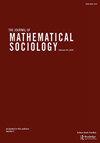投影签名双模网络
IF 1.3
4区 社会学
Q3 MATHEMATICS, INTERDISCIPLINARY APPLICATIONS
引用次数: 3
摘要
签名双模网络到目前为止主要使用块建模技术进行分析。在这项工作中,我们提出了将这种网络投射到其模式上的想法。介绍了两种投影方法,利用已知的加权网络二分类工具得到一个简单的有符号网络。然而,事实证明,由此产生的网络可能包含矛盾关系,定义为积极和消极关系的连接。我们证明了这需要与网络相关的矩阵的重新表述,并引入了复杂邻接矩阵和拉普拉斯矩阵。这些矩阵被用来证明一些与平衡理论有关的性质,包括矛盾性。本文章由计算机程序翻译,如有差异,请以英文原文为准。
Projecting signed two-mode networks
ABSTRACT Signed two-mode networks have so far predominantly been analyzed using blockmodeling techniques. In this work, we put forward the idea of projecting such networks onto its modes. Two projection methods are introduced which allow the application of known dichotomization tool for weighted networks to obtain a simple signed network. It turns out, however, that resulting networks may contain ambivalent ties, defined as conjunctions of positive and negative ties. We show that this requires the reformulation of matrices related to the network and introduce the complex adjacency and Laplacian matrix. These matrices are used to prove some properties related to balance theory including ambivalence.
求助全文
通过发布文献求助,成功后即可免费获取论文全文。
去求助
来源期刊

Journal of Mathematical Sociology
数学-数学跨学科应用
CiteScore
2.90
自引率
10.00%
发文量
5
审稿时长
>12 weeks
期刊介绍:
The goal of the Journal of Mathematical Sociology is to publish models and mathematical techniques that would likely be useful to professional sociologists. The Journal also welcomes papers of mutual interest to social scientists and other social and behavioral scientists, as well as papers by non-social scientists that may encourage fruitful connections between sociology and other disciplines. Reviews of new or developing areas of mathematics and mathematical modeling that may have significant applications in sociology will also be considered.
The Journal of Mathematical Sociology is published in association with the International Network for Social Network Analysis, the Japanese Association for Mathematical Sociology, the Mathematical Sociology Section of the American Sociological Association, and the Methodology Section of the American Sociological Association.
 求助内容:
求助内容: 应助结果提醒方式:
应助结果提醒方式:


